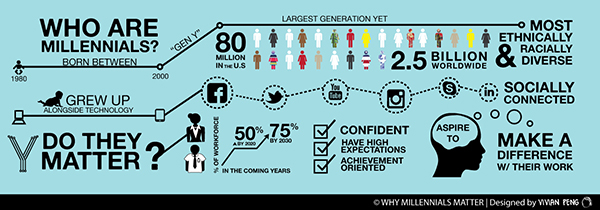I have heard for a while now that millennials (born 1980-2000) highly value authenticity, transparency and vulnerability. I’ve been pondering with some others (like the group of millennials that make up my advisory team, the Y&F Working Group, and our millennial summer student) what this means. Here are some of our thoughts.
• Millennials aren’t staying away from church because they’re not interested in spiritual things. They are staying away because the church doesn’t jive with their values. They highly value authenticity in themselves. Rather than “hang-out” somewhere or with a group of people that don’t match their values, they stay away.
• Gimmicks won’t work with millennials. They see right through them and are suspicious of churches. They are watching for any hint of bait and switches from the start. The free gift for filling out the visitor card will just make them want to fill out the visitor card less. Just give them the real reason, the WHY, behind why they should fill in the visitor card, give money, be a part of an event…
• Millennials get excited (expressing itself in multiple hashtags or Instagram pictures of them jumping up in the air) when a group of people start making a real difference in the world. Hmmm….didn’t Jesus come bringing His Kingdom that rights wrongs, heals brokenness, corrects injustices and frees the oppressed.
• If you don’t have places in your church for people to find safe, authentic community where they can be real with each other about life, millennials won’t stick around long.
• Millennials like to know they are getting the real you, especially if you are one of the upfront leaders. Share yourself, share stories and be vulnerable – from the stage, on social media and in community. It has stuck with me that a millennial told me they were at a leadership event where they were talking to one of the “known”, key leaders. They’d asked this key leader how they were doing and they responded with an over the top “Great…” explaining how well things were going. This millennial said they were two steps away when that key leader started saying to someone else how tired they were in this season. That was all it took for that millennial to be completely turned off that leader.
• Millennials are open to intergenerational relationships that talk about real life and where they can see real life lived out. They are not just looking to hang out with their own age group, but especially value spending time with anyone that will listen, value their thoughts and opinions and be vulnerable back.
• Millennials value experiences, because experiences are authentic. You are experiencing the thrill/emotion/newness for yourself and no one can take that away.
• Millennials look for character, especially in their leaders. Character is revealed over time as they see their leaders in various situations and settings. In a class I teach to both undergrad and graduate students (mostly millennials in the class), I set-up a debate arguing for either competence or character in leadership. While the obvious answer is we absolutely need both, it was clear the millennials highly valued character.
• Millennials are interested in getting to know the real Jesus, not the Jesus constructed by an institution. They want to see a Jesus that works and makes a significant difference here and now.
• Church is completely foreign to most millennials, and so can feel inauthentic because it is so outside their normative experience.
Help us out – what are the implications of these things? How do we use this awareness to connect with millennials?
-Renée @r_embree #1neighbourhood


